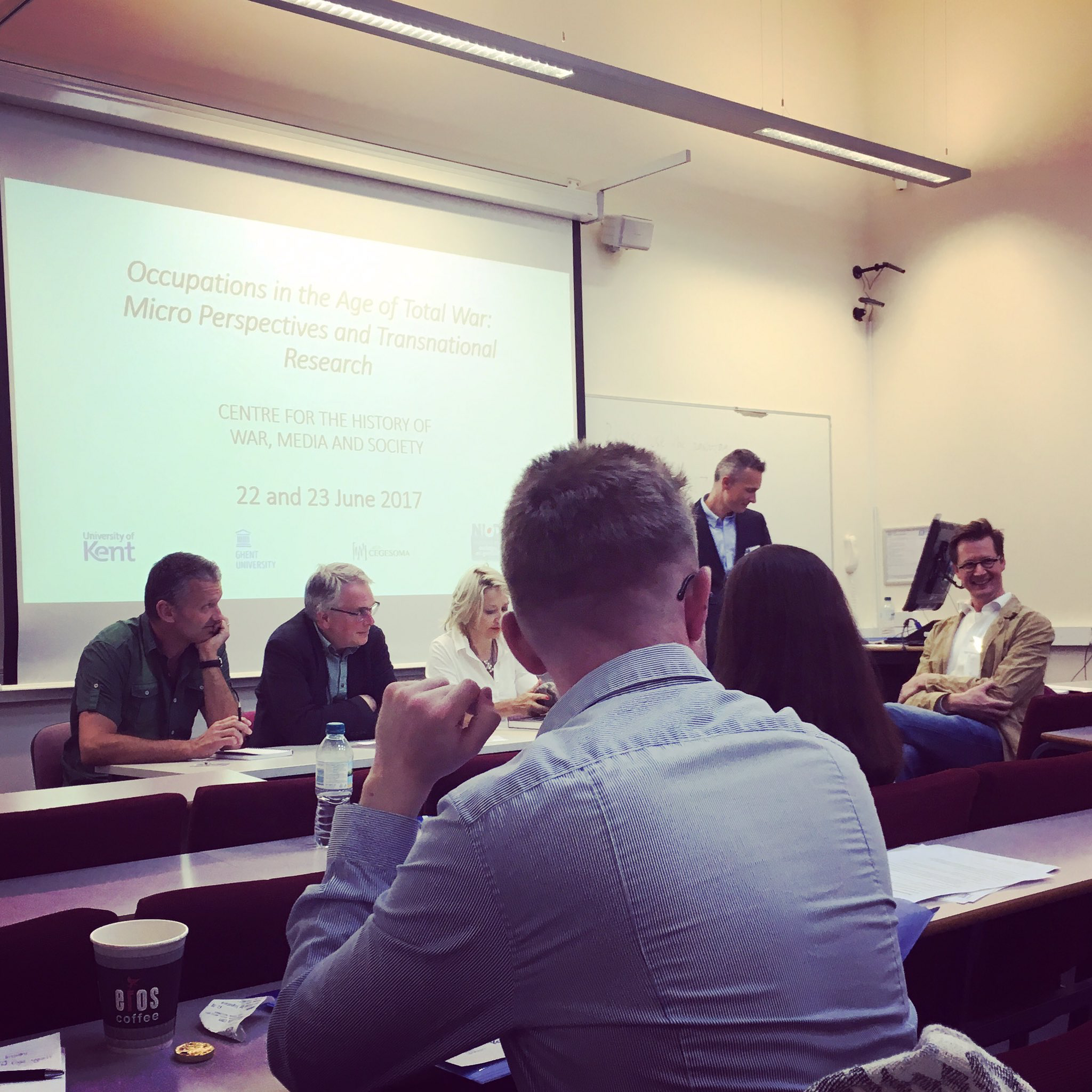Written by Oli Parken.
The Centre for the History of War, Media and Society welcomed colleagues across Europe and the US to the conference ‘Occupations in the Age of Total War: Micro Perspectives and Transnational Research’ in June 2017. The aim of the two-day event was to bridge the gap between structural and micro approaches to the occupational history of both world wars, pushing past conclusions made within national boundaries. The conference came in response to the publication of Nico Wouters’ monograph Mayoral Collaboration under Nazi Occupation: Belgium, the Netherlands and North France, 1938–46 (Palgrave Macmillan: Basingstoke/New York, 2016) (University of Ghent and CegeSoma). Thus, the papers given expanded on Wouters’ methodological innovation of approaching ‘occupations’ through the lens of the micro and macro in the age of ‘total war’.
The conference began with a keynote address by Sophie De Schaepdrijver (Penn State University), which posed a conceptual and definitional questioning of ‘occupation’. Can we objectively identify what an occupation is, or was? The first of four sessions sought to answer this question by focusing on various elites in command various occupations in the twentieth century. Papers by Philip Boobbyer (University of Kent), Jan Naert (University of Ghent), Jan Julia Zurné (CegeSoma), Markus Wahl (IGM, Stuttgart), and Peter Romijn (NIOD, Amsterdam) pointed towards pragmatism and negotiation the occupational rules of various elites. Occupations were not merely ‘top-down’ forms of governance, but required flexibility and co-operation with those being ruled in order for them to work in practice.
The first day ended with the launch of Mayoral Collaboration under Nazi Occupation. Wouters’ gave a brief summary of the book before a panel discussion between Sophie De Schaepdrijver, Martin ConTway (University of Oxford), Pieter Lagrou (Université Libre de Bruxelles), chaired by Stefan Goebel (University of Kent). The power of Wouters’ work, all three panellists agreed, was its re-conceptualisation of ‘the Mayor’ situated between the micro and macro. As Conway highlighted, Wouters’ work illustrates how, through Mayors, power was pushed from formal structures to the local level in unexpected ways, resulting in a continuity of state structures and a revival of civil society through ‘local states’.
The second day began with a themed panel on ‘spaces’ of occupation. Papers by Ismee Tames (NIOD, Amsterdam), Nigel Perrin (University of Kent), and Christoph Mick (University of Warwick) explored how the experience and control of spaces influenced occupations. The paper highlighted how the spatial boundaries of occupation were often blurred; in terms of memory (of previous occupations) and imagination as well as actual geography. The third panel focused on social groups and dynamics, the conclusions of which chimed with those from the first panel. Papers by Gertjan Leenders (University of Ghent) and Jovana Knezevic (Stanford University) both pointed towards the negotiation process between the occupiers and those being occupied. The papers offered an important challenge to the binary of ‘occupier’ and ‘occupied’, highlighting how pragmatism and self-preservation were often drivers of co-operation between the two. The final panel focused on experiences and memories of occupation. Papers by Ludivine Broch (University of Westminster) and Barbara Deruytter (University of Ghent) pointed towards various ways in which occupiers actually had great scope to shape the experience and subsequent memory of occupation. Perhaps most interesting, the panel reinforced how the experience of occupation was not bound by geographical or temporal boundaries. The memory of occupation had a profound impact on how nations and societal groups would come to view itself and themselves post-occupation.
Where does this leave our understanding of occupations in the age of total war? Concluding remarks were made by Stefan Goebel and Nico Wouters. The speakers noted the fruitfulness of bringing different focal points and questions to bear on ‘occupation’; revealing a more complex mechanism of systems behind the surface. The takeaway point for both Goebel and Wouters was the power of the conceptual questioning of ‘occupation’. How can we historicize the meaning and terminology of occupation across geographical and linguistic divides; does the use of the term lead to more insight, or does it run the risk of itself becoming a limiting ‘model’? Further work is clearly needed on occupations outside the age of total war to push the boundaries of how we approach the concept historically.
Oli Parken is a PhD researcher and Assistant Lecturer at the University of Kent. His PhD focuses on various aspects of alternative belief within British civilian and military spheres between 1939–1950; including ghost sightings, recourse to astrological columns, and superstitious beliefs. His research interests lie in twentieth-century British social and cultural history, particularly during the era of the World Wars.

